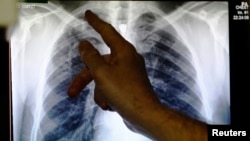Incidences of multi-drug resistant tuberculosis (MDR TB) are increasing, but British and Peruvian researchers are offering a glimmer of hope in the latest issue of PLOS Medicine.
Caused by a bacterium that has evolved to become hard to kill with two or more mainstay antibiotics, MDR TB, the new study indicates, is actually less infectious than drug-susceptible TB among patients' close family members and friends.
Almost a half-million cases of MDR TB were reported to the World Health Organization in 2013.
Frequently occuring in patients who had previously been treated for the regular TB, or in those infected with HIV, MDR TB -- also known as anti-microbial tuberculosis -- is thought to result when patients failed to finish their course of the cheaper and more accessible drugs such as rifampicin and isoniazid, giving the bacterium time to develop defenses against the antibiotics.
According to experts, treatment courses for MDR-TB can take up to two years, using as many as a half-dozen older antibiotics, with an often highter fatality rate as a result of drug toxicity.
Researchers have also discovered that drug-resistant strains of TB have a lower “fitness” for spreading to relatives and close associates of those infected with it.
Tropical disease specialist, Dr. Louis Grandjean of Imperial College London, led the study in Peru.
“In becoming drug-resistant, the bacteria undergo what is called a “fitness” cost," Grandjean said. "So it’s able to survive in the environment of antibiotics, but it’s less able to jump from person to person and cause disease.”
For three years, Grandjean and colleagues followed more than 1,000 household contacts of people with MDR-TB and more than 2,300 contacts of patients with drug-sensitive tuberculosis in Lima.
Thirty-five of the multi-drug-resistant contacts became sick, compared to 114 of those in the drug-susceptible group.
Investigators report that contacts of the multi-drug resistant group were 44 percent less likely than contacts in the treatment-sensitive to get TB.
Grandjean said, however, that doesn’t make multi-drug-esistant tuberculosis any less of a threat.
“It’s still a huge problem despite what we found in the study, which is encouraging and suggests that the tuberculosis program, which is working at full capacity to try to control multi-drug-resistant tuberculosis, is still a great problem,” he said.
Given the seriousness of the MDR-TB threat, Grandjean said monitoring and treatment efforts to fight it should not waver.




